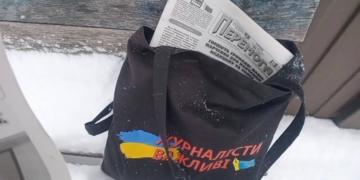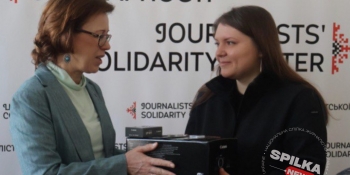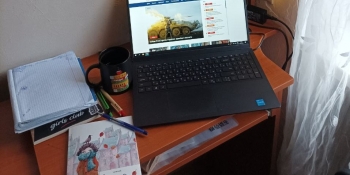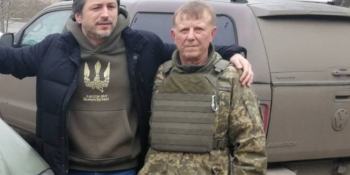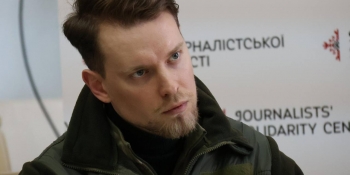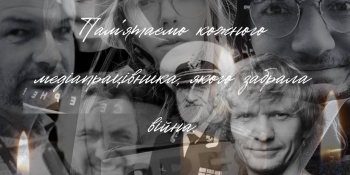Last year was extremely difficult for all spheres and industries in Ukraine. The media could not help being not included. A journalist of the Ternopil Press Club spoke with President of the National Union of Journalists of Ukraine (NUJU) Sergiy Tomilenko about what has been happening with the Ukrainian mass media, first of all with local publications.
“Mr. Sergiy Tomilenko, it is clear that there have been losses on the information front as well… Perhaps there are statistics on the total number of newspapers to have shut down, which editorial offices have ceased operations due to the occupation, which were evacuated and are working remotely?”
“There are currently no accurate final statistics, it is too early for it to exist, and there are no such official registers either for newspapers nor for television and radio. There are thousands of registered newspapers, but it is difficult to say how many of them are currently published, and there are no state registers on any online publications at all. But the key conclusion of the year is definitely disappointing. The consequences of the war together with the previous long-term unfavorable factors, as the ones from the quarantine due to the pandemic, led to the fact that the activities of many Ukrainian mass media companies ceased almost immediately. Parts of newsrooms, especially local ones that had stability, switched to volunteering and continue to inform people via websites and social media networks. But such activity is valuable, but does not provide an opportunity to support the media and their teams, to receive funds for the functioning of a full-fledged editorial process. Therefore, unfortunately, we have to state that mass unemployment of journalists has begun in Ukraine. And a lot of colleagues have recently turned to us for advice and consultations regarding the liquidation of newsrooms, staff reductions, and more. At the same time, a part of the media “as shown, in particular, by our survey on the Telegram channel of the Union, it is about 10% “even note the growth of their opportunities, increase in wages, expansion of activities, etc. Honestly speaking, this happens not at the expense of the Ukrainian market, but at the expense of the opportunities offered by various donor programs, institutions, funds that provide grants on a competitive basis. And, accordingly, those editors and journalists who have some experience in writing grant projects have the maximum opportunities for their implementation and obtaining funds. As an inspiring example, we can cite the results of our colleagues from Volodymyretskyi Visnyk (Rivne Region), which received over UAH 500,000 in 2022 to support their publication due to participation in grant projects and programs.”
“Did donor aid from abroad become the only lifeline for Ukrainian editorial offices?”
“Another important direction was the optimization of editorial operations through reductions, savings, improvement of processes, etc. But some of the media, primarily from the de-occupied territories “for example, Kherson, Izium, Lyman, Bakhmut “have no internal resources left at all. After all, editorial offices were destroyed, property was ruined, and the situation for the media business could be compared to “scorched earth.” In such cases, recovery became possible only thanks to international programs and initiatives. By the way, the support of such newsrooms is also a priority for the NUJU. We promptly respond to the liberation of Ukrainian territories from the occupiers, we immediately look for editors and are the first to address proposals for the resumption of activities. Thus, at the expense of the donations of our foreign partners, in particular, from Japan, we were able to finance the release of the first issues of 15 newspapers in various regions after the de-occupation.”
“I know that the Union is currently doing a lot for editorial offices. What are the main areas of assistance?”
“With the beginning of the war, all our work turned into a “hotline”. Accordingly, we assist or try to respond to all requests and challenges journalists and the media turn to us with. I have already spoken about one of the directions “the resumption of publishing newspapers in the de-occupied territories. The second was emergency material assistance to journalists who were evacuated, displaced journalists and those who were in one way or another affected by the war. Thanks to the funds of the International and European Federations of Journalists, since March, such payments have been provided to hundreds of Ukrainian journalists. We also provide technical assistance “laptops, cameras and other equipment to colleagues in need, primarily from the de-occupied territories.” The next direction of our activity is the creation of a network of journalist solidarity centers. In six regional offices, our employees have created a kind of invincibility points with all the necessary equipment, communication and other things that colleagues need. Through this network, comprehensive assistance is also provided on various issues journalists contact us with. Another area of our activity is aimed at improving the physical and psychological safety of journalists. The mentioned solidarity centers and regional branches of the NUJU have also become a kind of rental point of protective equipment (body armor, helmets, tactical first-aid kits, etc.) for media workers who go to the combat zone. These are high-quality branded items provided primarily by the UNESCO headquarters and the International Federation of Journalists, as well as other foreign partner organizations. We developed a psychological assistance service in response to requests from our colleagues. With the assistance of the UNESCO headquarters, we opened a “hotline” for psychological assistance to journalists and their family members. We cooperate with highly professional psychologists and psychotherapists who have experience in operational counseling. In addition, with an educational mission, we hold monthly webinars for journalists on psychological safety and support.
And finally – the expert direction, which took shape as a result of direct contact with hundreds of journalists. The association provides high-level expertise for international partners and donors, we act as mediators and advocates of Ukrainian media working in the regions. We verify journalists, editors, situations in newsrooms, so we inform our foreign partners about these cases to receive financial support. As an example, we developed such cases together with the Academy of the Ukrainian Press for the IREX organization, which therefore provided significant support to the Kherson newspaper called Novyi Den immediately after the evacuation of the editorial office from Kherson. Also, in partnership with Polish and Scandinavian companies, large-scale projects were implemented to support local media, thanks to which journalists, participants of our creative projects entitled We are from Ukraine! and Journalists are Important! received funding from Polish and Scandinavian media on our recommendation. In general, the industry received more than EUR 80,000 for these purposes. And one of the latest good examples of recognition of the Union’s expertise was the fact that the Swiss Hirondelle Foundation started the implementation of a 10-month project to support the sustainability of 20 regional media in the east and south of Ukraine. In conclusion, I would call the word “solidarity” the key word of the year, because it was thanks to it and the joining of efforts that we were able to help many newsrooms and journalists.”
“As far as I understand, the support of foreign donors is mainly aimed at regional and local media. And what about helping the national newspapers, which are almost gone, and which are in an equally difficult situation?”
“Today, the NUJU has the opportunity to support mainly local and regional media, which are a priority for our foreign partners, or individual journalists. But there are also great opportunities for national media in various grant projects. You just need to follow the offers and actively participate in all competitions. As for personal assistance to individual colleagues, it was also provided to employees of national publications that suffered as a result of the war. It will be like this in the future. So our six-month advocacy of economic support for journalists of Ukraine before international donors was successful in that the UNESCO headquarters supported us and announced the provision of emergency grants for journalists who continue to remain in the profession, even though the war has seriously affected their financial situation. We conducted a competitive selection of candidates (there were 500 applications), and recently 160 people were funded – they receive a scholarship equivalent to USD 600. Among them are about 30 journalists representing national and local Kyiv media.”
“Mr. Tomilenko, this is a completely different topic, but I cannot help asking you to comment on the adoption of the ambiguous Law on Media, some of the provisions of which have been actively opposed by the Union, as well as journalists and editors of Ukrainian publications, for a long time.”
“Yes, the “series”, which has been going on since 2020, has ended. On the one hand, as a professional union, we, of course, welcome the implementation of Ukraine’s European obligations. In particular, we support the fight against enemy propaganda and strengthening responsibility for it. At the same time, we, like our foreign partners – the International Federation of Journalists, the European Federation of Journalists, the American Committee to Protect Journalists – emphasize certain concerns. They relate to the fact that a huge amount of power and authority is concentrated in the hands of the national media regulator. As you know, the National Council on Television and Radio Broadcasting is already becoming a single regulator for all types of mass media and, in particular, for all print and online media. Our reservations primarily concern the political independence of the media regulator in conditions where members of the National Council are appointed by the President or the presidential majority in the Verkhovna Rada. In contrast to the countries of established Western democracies, where such a regulator has high public trust, because there are authoritative media representatives and there is direct accountability to society and the media community, not to the authorities. Another disturbing fact is that in this difficult time of war, when journalists are constantly fighting both on the information front and for the survival of their media companies, the document with a volume of almost 300 pages was adopted without proper discussion and appropriate assessment. Our journalists and editors are law-abiding citizens, so it is very likely that situations will arise that they will be forced to spend precious time not on creating materials needed by readers, and not on saving their media, but on about 300 pages in order to comply with all requirements and not receive any fines or prescriptions.
Of course, the final wording of this law is much softer than the initial one, which was published in 2020. And this is the merit of the NUJU and many independent journalists who have been actively defending their rights all this time. As a result, the authors and developers softened some designs and took certain comments into account. Despite this, I would like to draw attention to the conclusions of the legal department of the Verkhovna Rada, which were made public the day before the vote, and which also pointed out numerous inconsistencies in the bill, which may cause many problems during practical application. The lawyers also noted that the justification of the necessity of provisions on all 300 pages by the requirements of European institutions is not entirely correct. Therefore, we can only hope that if an important European directive has finally been implemented, and the European Commission and governments of European countries should act as guarantors of freedom of speech in Ukraine and that the new law does not lead to systemic repression and in order for those organization and countries to really join in help when there are attempts to somehow omit those European values and declarations announced in favor of the adoption of this law.”
“Is there any important message you would like to address to all colleagues?”
“I’d like to call on journalists and editors to do their best, despite all existing problems and difficulties, to remain in the profession and not to quit it, because the mission of journalism is extremely important for Ukrainian society today. In its turn, the NUJU, as the largest professional association of media workers of Ukraine, will do everything possible to provide them with maximum support in the most difficult periods of activity with the help of foreign partners and international organizations. But I also ask my colleagues to be as active as possible in finding resources, to follow all announcements, to believe in their own strength and in the support of donors, to learn new things, to persistently seek support for both their media and their readers. It definitely works! And it is necessary to use all the opportunities that have appeared thanks to the global international solidarity in support of Ukrainian media that exists today.”
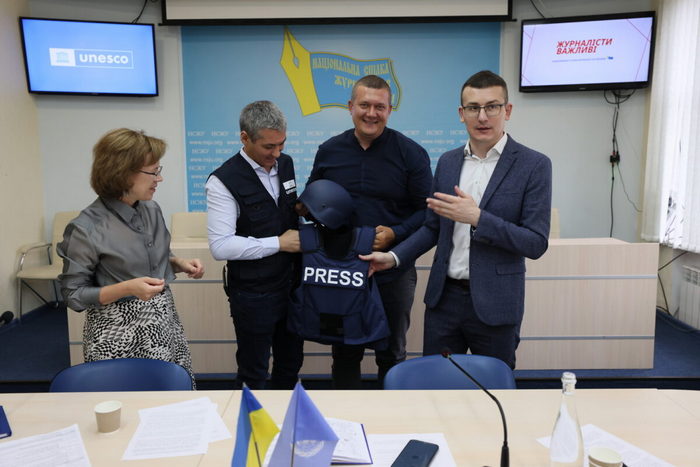
About UNESCO
UNESCO is the United Nations Educational, Scientific and Cultural Organization. It contributes to peace and security by promoting international cooperation in education, sciences, culture, communication and information. UNESCO promotes knowledge sharing and the free flow of ideas to accelerate mutual understanding. It is the coordinator of the UN Plan of Action on the Safety of Journalists and the Issue of Impunity , which aims to create a free and safe environment for journalists and media workers, thus strengthening peace, democracy and sustainable development worldwide. UNESCO is working closely with its partner organizations in Ukraine to provide support to journalists on the ground.
Interviewed by Svitlana Mychko, Ternopil press club NUJU photo archive





